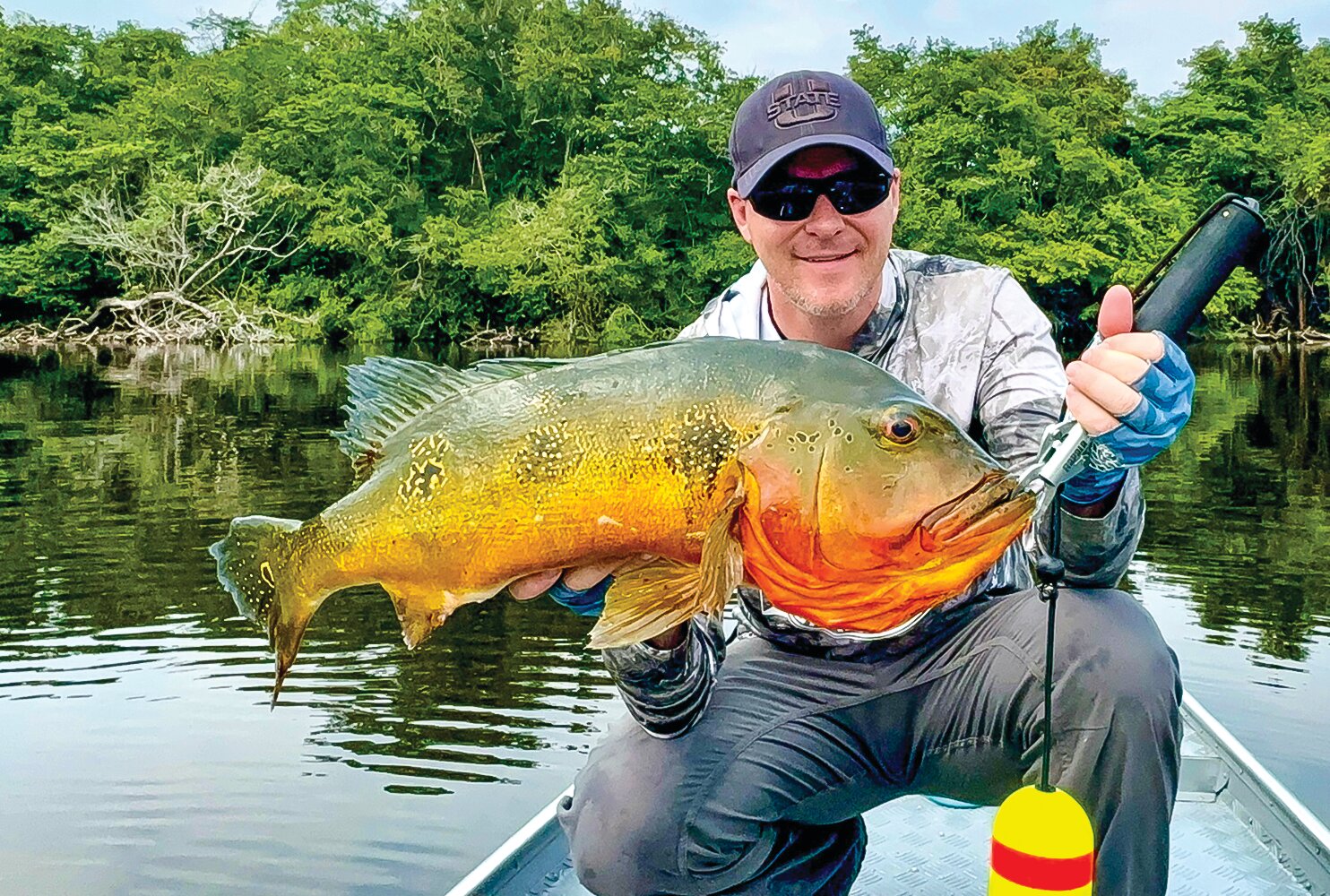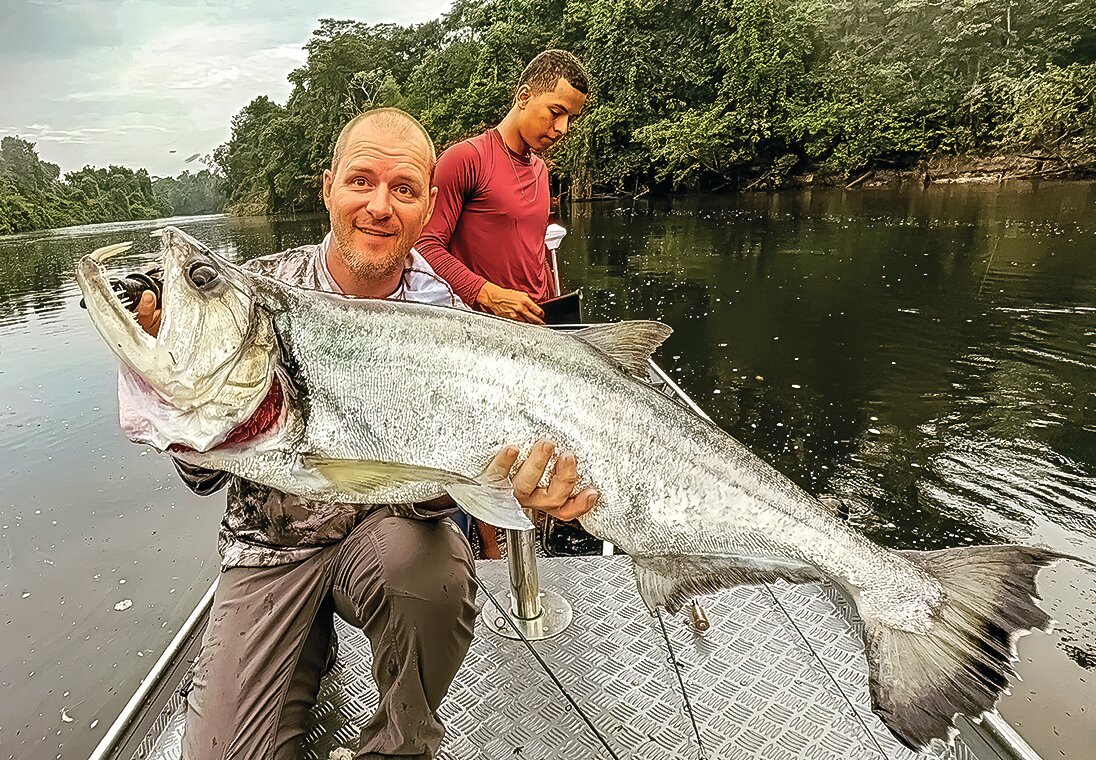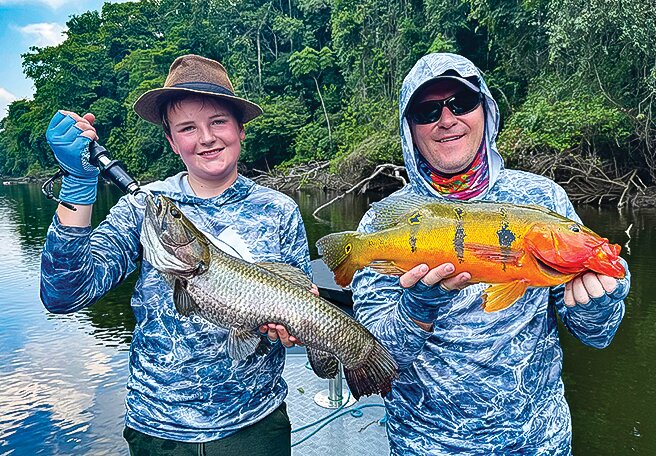Support the Timberjay by making a donation.
The big fish quest
Orr angler takes his passion to the extremes in his hunt for records
ORR- When is a world-record fish not a world record? Adam Van Tassell of Orr knows the answer to that question all too well, as his would-be world-record fish is these days lazily cruising the waters …
This item is available in full to subscribers.
Attention subscribers
To continue reading, you will need to either log in to your subscriber account, below, or purchase a new subscription.
Please log in to continue |
The big fish quest
Orr angler takes his passion to the extremes in his hunt for records
ORR- When is a world-record fish not a world record?
Adam Van Tassell of Orr knows the answer to that question all too well, as his would-be world-record fish is these days lazily cruising the waters of a lagoon off the Rio Cururu in the Amazon.
It’s the record that got away.
But before getting to that adventure, a little backstory is in order.
Van Tassell’s zest for pursuing what he calls “braggable” fish knows no bounds. Inspired by the fad of books and lists with titles like “101 Places to See Before You Die” and “101 Business Deals You Need to Look At,” Van Tassell chose his own 101 quest about a decade ago.
“I said I’m going to do 101 braggable fish,” he said. “Not only are they different species, but they have to be braggable. They’re maybe not trophy class, but big enough that when you go back and show the pictures people go ‘Whoa!’”
The show “River Monsters” and its host, extreme angler and biologist Jeremy Wade, who travels the globe in search of big and dangerous fish, was a major inspiration for Van Tassell. It’s a show he and his 13-year-old son Brock watch together.
“He goes all over the world catching these crazy fish and I was just mesmerized by this,” Van Tassell said.
And because Pelican Lake falls far short of fulfilling the 101 species on his list, Van Tassell travels the world, too, taking his son with him.
“We’ve done two trips to the Amazon,” Van Tassell said. “We’ve done a fishing trip to Costa Rica, and Belize several times. I’m going to Costa Rica in three weeks for another fishing trip. I’ve got a trip to Argentina in November and then Guyana, just north of Brazil, we’ll go there in February of next year. The goal has been much more expensive than I anticipated.”
It’s quite an about face for someone who wasn’t really into fishing as a kid.
“I had done a little fishing growing up in high school in Utah, but not much, like Boy Scouts, but that’s really more like throwing rocks in the water while your line’s out there somewhere,” Van Tassell said.
It was a summer job he had at Pine Point Lodge on Crane Lake where owner Jeff Erickson got him hooked on fishing, Van Tassell said.
“Jeff taught me to bass fish,” he said. “And it just kind of exploded in me. I got this desire to fish all the time.”
That job also gave Van Tassell’s girlfriend at the time, Kasey, a reason to come visit in 2004. He’d told her about the beautiful sunsets and fantastic fishing, and it was something she needed to see for herself. The girlfriend became fiancé when Van Tassell took Kasey to Vermilion Falls to propose.
After time spent in Utah, Key West, and Hawaii, where Van Tassell attended college and earned a business degree in hospitality and tourism management, the couple found themselves back in Minnesota in 2010 working for a canoe outfitter in Ely. In 2011 they joined another couple in taking on a fishing lodge on the Gunflint Trail, until they sold their share in 2014.
Van Tassell and his wife, Kasey, then purchased Birch Forest Lodge on Pelican Lake in 2015. It was an opportunity they’d been waiting for, a chance to put down roots for their young family in the Minnesota North Country they’d come to love. The Van Tassells and their youngsters, Brock and Adyson, soon welcomed another child, Chase, into the family. Their dream of owning and operating a small family oriented outdoor recreation resort had finally been realized.
Stalking peacock bass
When Van Tassell and his son traveled to Brazil with one of his friends and his teenage son last November, they were primarily on the hunt for peacock bass. Van Tassell had met an outfitter from Brazil at a sport show several years ago who had told him about them.
“The peacock bass is considered the hardest biting bass in the world,” he said. “There are over a dozen recognized species of peacock bass, and each species has its own world record.”
However, when fishing in the Amazon basin, you never know what you might catch, Van Tassell said.
“We have caught monster piranhas, 200-pound catfish, vampire fish with fangs that are over two inches long, it’s just amazing,” he said. “There’s 3,000 species of fish that live in the Amazon basin alone, and 90 percent live nowhere else in the world.”
To say that Van Tassell’s fishing destination was remote is an understatement.
“The Amazon River has thousands of tributaries. We were 900 miles from the main Amazon River,” Van Tassell said. “We had to take a three-hour plane ride to a grass dirt airstrip. From there we drove 90 minutes. Then they floated us and our trucks on homemade rafts down a river to another remote road.”
And when Van Tassell’s Portuguese-speaking guide realized they wanted to catch really big fish, there was more trekking to do.
“There was this lagoon that was off the beaten path,” Van Tassell said. “We had no idea what we were getting into. We took the river and we had to take the motors off the boats and we literally dragged the boats over this bit of dry land. We had to cut logs to roll the boats on. So, we’re portaging the boat, and we get in this little dried up creek bed and we are floating and dragging it through, walking in ankle to knee-deep mud. The whole time you’re thinking about all the stuff that can kill you in that water – leeches, insects, little snails, electric eels, sting rays, and piranhas, so you’re thinking this had better be worth it.”
They reached the lagoon at midday, not an ideal time to be fishing for bass.
“I changed up and decided to throw a feather jig, like a big jig head with all these feathers on it,” Van Tassell said.
He gestured to the guide to get away from the edge and move toward deeper water, thinking the bass likely would have moved there.
“I only take about three casts and suddenly my rod just bent right over,” Van Tassell said. “I set the hook and the drag just started zipping and I thought oh man, we found the lunker. We got it in the boat, and we were just so excited.”
Van Tassell estimated it took about two minutes to pull the fish up alongside the boat, and it was clear it was bigger than anything they had been catching, because it wouldn’t fit properly in the net.
It was a peacock bass, evident from the bright orange coloring underneath and the stripes on its sides. But beyond that, Van Tassell didn’t know which particular species he’d caught.
The video taken of his catch shows him holding it up with a Boga Gripper scale clamped to its lower jaw.
“Whoo, nice fish, 12 pounds,” he exclaimed.
While Van Tassell would have been happy with some pictures, his guide insisted that they measure the fish. He evidently had some sense that the fish could be special. With the world record for one variety of peacock bass coming in at nearly 30 pounds, Van Tassell said, he had no idea that he was about to return a world record member of the fire peacock bass species back into the lagoon.
“I didn’t think It was a world record. I let it go,” he said.
About six weeks later, Van Tassell was contacted by the Brazilian government, he said. His guide had turned in the measurements along with Van Tassell’s contact information to the Brazilian Game Fish Association.
“They said, ‘Did you know the world record (for fire peacock bass) is 10.6 pounds and you apparently recorded a 12-pound fish?’ and I said no, I had no idea,” Van Tassell said.
But the information provided wasn’t enough to certify the catch as a world record.
“To verify the weight for International Game Fish Association standards you have to take the fish onto dry land and you have to hang it from a level brace with no one touching it, and the whole process is to be videoed, and you have to use a certain type of scale,” Van Tassell said. “We didn’t do any of that. It kills the fish when you do that, and we were just trying to get it back in the water.”
The fish would have qualified for the Brazilian record, but only Brazilian citizens are allowed to be national record holders, Van Tassell said, so he missed out a second time.
“But they have a whole category for foreigners who break Brazil records,” he said, “so I’m in that record, even though mine is better than the Brazilian one. They sent me a certificate which I’ll have framed, and we have a lot of photos and the video.”
Van Tassell still has the personal satisfaction of being a world-record holder without a record, with a bass larger than any he might have caught in Pelican Lake, or Minnesota, for that matter. And he got to check fish No. 53 off his list, which still leaves a whole lot more fishing to do.
“I just passed the halfway point,” he said. “The problem is every time I catch a fish it makes getting the next one more difficult because that fish is not on the list anymore. And they’ve got to be big enough to brag about. It’s going to be another ten years.”
To let people follow along on Van Tassell’s fishing adventures, he and his son have created a YouTube channel, “Crazy Good Fishing,” where you will find the video documenting his world-record-sized catch and dozens more.











